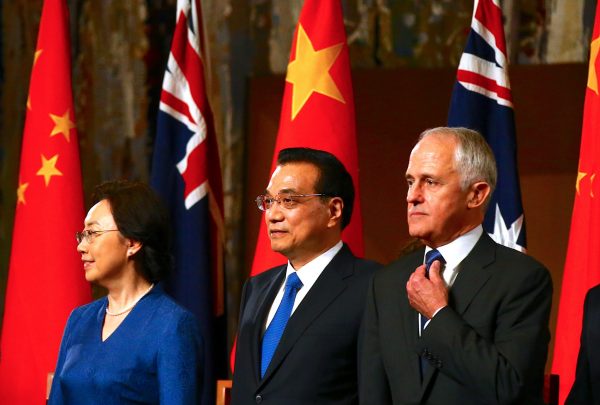Effective multilateral institutions with universal membership would knit closer ties. Security would be underpinned by US leadership and a network of its alliances. That world no longer exists.
The year began, appropriately enough, with the inauguration of US President Donald Trump. The new administration’s early and easily disproved claims that record crowds had witnessed this event suggested that the world was dealing with a different sort of US president. An unprecedented leak a week or so later revealed the details of his first telephone call with Australian Prime Minister Malcolm Turnbull. The familiar, comfortable conventions of such conversations between close allies were spectacularly absent.
Australian and US interests have often differed before, but the divergence of values is new. Trump has pulled out of the Trans-Pacific Partnership, which was designed to support the open trading system that the United States itself created. His support for the rule of law has been ambiguous at best. He has criticised close allies and failed to defend the values of democracy.
The US State Department, drained of people, is led by a secretary of state who looks as though he would rather be anywhere else. In multilateral institutions, the United States is simply abandoning the field. The administration has withdrawn from the Paris climate agreement and from UNESCO. It is bringing the World Trade Organization’s dispute resolution system to its knees by vetoing appointments of new judges.
No doubt a more familiar sort of US government will take office in three or seven years. Even when this happens, this experience will have fundamentally altered the United States. The high-water mark of US liberal internationalism has passed.
Equally significant changes took place in China in 2017. The Communist Party Congress in October cemented Xi Jinping’s position as the party-state’s strongest leader since Mao. The year marked the clear end of Deng Xiaoping’s cautious advice that China should ‘hide its brightness and bide its time’. A country cannot do that when it is by some measures already the largest economy in the world.
China is moving out to shape the world by establishing new institutions like the Asian Infrastructure Investment Bank and by promoting its geo-economic plans through the Belt and Road Initiative. Xi asserts Chinese leadership on climate change and (less plausibly) on open trade. 2017 was also the year the Western world had to abandon any expectations that China would gradually democratise as it grew.
Chinese influence grew very quickly in Southeast Asia. Several Southeast Asian governments, including in the Philippines and Cambodia, have taken on unpleasantly authoritarian aspects.
North Korea became a fully-fledged nuclear power in 2017 and no one knew what to do about it. Twenty rocket tests (including of intercontinental ballistic missiles and new nuclear warheads) brought Pyongyang close to having the capability to threaten the continental United States. The strongest ever UN sanctions and provocative tweets from Trump did nothing to reduce Kim Jong-un’s dangerous potential to spark a war.
In the Middle East, the good news that so-called Islamic State (IS) forces had been beaten back in Iraq and Syria was balanced by sharpening divisions between Sunni and Shi’a interests in Yemen, Lebanon and Qatar. The struggle against terrorism continued in Asia as well. Australia provided training and intelligence support to Philippine forces fighting IS-aligned insurgents in southern Mindanao. But the victims of terrorism remain overwhelmingly concentrated in the Middle East — in Tehran, Baghdad, Kabul, Syria and Egypt.
Too often out of sight were the 135 million people in need of humanitarian assistance and protection in places like East Africa, Lake Chad, Yemen and Syria. Closer to Australia, 600,000 Rohingya refugees from Myanmar sought sanctuary in Bangladesh.
No wonder that the Australian Foreign Policy White Paper (which came out at the end of the year) described a contested and uncertain world in which the stakes have never been higher for Australia.
Australia itself is changing too. Census data released in July showed that 28 per cent of the Australian population was born overseas — a figure higher than at any point in the past 120 years. After English, the languages most frequently spoken in Australian homes were Mandarin, Arabic, Cantonese and Vietnamese.
The world learned something else important about Australia in 2017. Luminescence dating of artefacts found in a rock shelter near Kakadu pushed back the date of human settlement in Australia to an astonishing 65,000 years. That’s enough to put even Donald Trump into perspective.
Allan Gyngell is national president of the Australian Institute of International Affairs (AIIA).
An extended version of this article originally appeared here at AIIA’s Australian Outlook publication.


There also seems to be a loss of good leadership in the Western world. I cannot think of anyone in Australia or elsewhere like Hawke-Keating, Reagan-Gorbachev. We ought to have an effective climate change policy by now, and we ought to be tackling the refugee crisis, while working on a long- term path to global nuclear disarmament.
We also ought to be working with China in the Belt, Road project, not against China. If we want developing countries to give up coal plants, we need to help them meet their energy and infrastructure requirements without compromising their growth potential.
We ought to make universal education and public health available across the world.
We ought to coordinate our tax policies vs competing with each other to reduce tax in wealth.